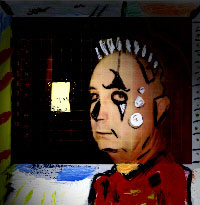|
For the archive of
Wil's poetry, fiction, and essays, click
here.
| Born
in Quito, Ecuador under auspicious circumstances (a
quarter moon shone on the right side of Mount Pichincha,
three albino condors flew over the plain of Iñaquito),
he soon found out that literature was an essential ingredient
of the world. He was three years old when, while looking
for cookies, he dislodged a large book (Stephen Zweig’s
Fortune’s Whim) which fell off a shelf and
hit him on the head. This immediately posed questions
about the meaning of light reading. |

|
Polaroid/mixed-media portrait of Wil Wynn
by Polaroid, cut (the window) and painted
by ZergioF. © Copyright 1997 by ZergioF.
All rights reserved.
|
|
Wil then learned to read at age four
(Spanish being a far simpler language to decipher than English)
and began reading anything and everything. At age five he
read Federico Garcia Lorca's Romancero Gitano. Of
course, he did not understand it, he only felt the beauty
of the language and how poetry invokes mythical worlds that
can be embraced for their sake alone, quite apart from rationality.
A couple of years later he read two other influential books,
both translations. One was Erich Maria Remarque's All
Quiet on the Western Front, the other Ernest Hemingway's
For Whom the Bells Toll. Despite their complexity, exceeding
a child’s understanding, the power of their language
helped him to connect with worlds of human experience far
beyond the insular nature of his life in a small country.
Fifty years later, after a lifetime
of reading, he decided to begin writing fiction and poetry.
His short stories have been published in The New Caducean
and Chiricu, among others. From 1990 to 1995 he edited
and published a small “Xerox” humorous publication,
The Journal of Applied Metempsychosis, which poked
fun at the more rigorous medical journals.
His poetry has been a source of pleasure
and enchantment for him and he has become an avid reader
and writer. He has received two grants from The Council
on the Arts and Humanities for Staten Island. The 1999 Premier
Grant was for a series of publications and readings titled
Poetry for the Six Senses. The second grant for the
year 2000 Encore, was for a secular oratorio, "Synchronicity,"
based on his poetry. This collaborative effort included
music by Doug Principato, direction by Greg Principato,
and performances by Pete Echanique, Ed Jackson and Heather
Rivas.
For a time, he published Nanci’s
Café, a review of open-mike poetry as found on
Staten Island.
Wil has read extensively through
the NYC area and has been featured at several locales, including
the Mediterranean Star in Brooklyn. He has published a poetry
collection, in collaboration with another Staten Island
poet, Adam Tamarkin, titled Trans For Mations. They
are both putting the finishing touches to another book of
poems titled Shout It! Poems for Reading Aloud While
Waiting for Subways in Deserted Platforms Late at Night.
He is a founding member of SI TRASH, a performance group which is the progenitor of The Sepoy Rebellion, our current poetry-performance group. He has been and continues to be inspired and delighted by the many talents of the other members, Allan Douglass Coleman and Marguerite Rivas-Hayes.
Wil is also a member of Tres Criollos, a collaborative of three arts: photography, painting and poetry. The other members are Irma Bohorquez-Geisler and Sergio Figueroa. With Marguerite Maria Rivas and others he is a member of Elektromotif,
the arts performance collective.
Wil loves the United States of America,
but especially New York. He dedicates his present and future
artistic efforts to the memory of those who perished in
the 2001 terrorist attacks at the WTC. He will not forget
them or those who died in the Pentagon or the plane crash
in Pennsylvania.
|